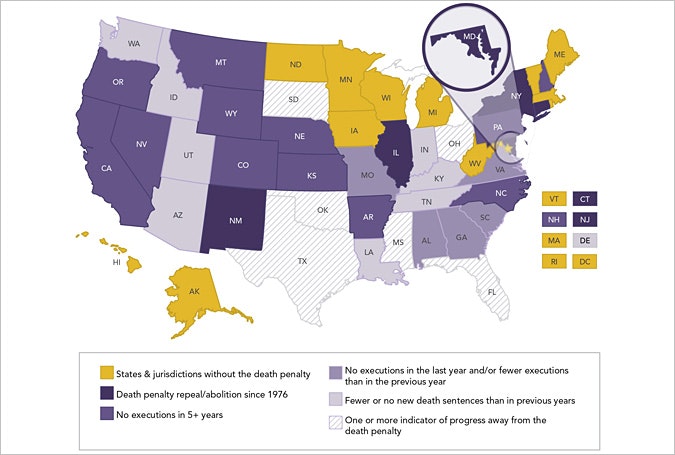Maryland, a Bellwether State on the Death Penalty
By Diann Rust-Tierney & Shari Silberstein

On Friday, March 15th, the Maryland House of Delegates voted 82-56 to pass a bill repealing the state’s death penalty statute. The Senate had previously passed the same bill on March 6th. The bill now goes to Governor O’Malley’s desk for his signature. As the sponsor of the bill, he has committed to signing it into law.
Maryland is the bellwether for the country on the death penalty. When the bill is signed into law Maryland will become the 6th state in six years to abandon the death penalty. It will be the first state below the Mason Dixon line to end capital punishment. Like other states that have taken a close look at the practice, lawmakers and citizens in the state have come to the conclusion that the death penalty system is simply unworkable.
Maryland tried everything to make the death penalty work: a moratorium, two studies, and the most extensive set of reforms this country has seen. It has tried for over 35 years to get it right. Maryland enacted significant restrictions to its death penalty in 2009, making it one of the narrowest in the nation. But the risks of error and unfairness remained.
The architect of the reforms, Maryland Senator Bobby Zirkin, previously supported the death penalty but this year became a pivotal vote in favor of repeal. Zirkin said that Maryland still risked executing an innocent person and that the state’s death penalty failed families of murder victims. What else made the difference?—principled political leaders who asked the hard questions and were honest about the implications of the answers, and the deep engagement of community members with their elected officials.
Maryland is leading the way. We expect that other states will draw important lessons from this process. Some will follow suit, conduct their own inquiries and likely arrive at the same conclusion. Others will determine that the ability to eliminate error, bias and unfairness from capital punishment is simply beyond our grasp.
Everywhere you turn, people are recognizing that the death penalty will always make mistakes, be applied arbitrarily, fail to keep anyone any safer, or meet the needs of victims’ families.
Families of murder victims were leading spokespeople in the campaign in Maryland. They secured a key promise from Maryland’s Governor, Martin O’Malley, to reallocate some of the death penalty’s high costs to improve services and support for homicide survivors.
With the death penalty, we squander precious resources in the false pursuit of a foolproof way of deciding who should live and who should die. These resources could be better used to prevent violence, hold people accountable and care for the survivors of homicide.
On the heels of this victory in Maryland, other states are also questioning their capital punishment systems. Repeal efforts are gaining traction in states like Delaware, Colorado, Kansas, Montana, Washington and Oregon (where a moratorium is in place). Arkansas Governor Mike Beebe recently announced he would sign a bill to repeal the death penalty if presented one by the state legislature. In Virginia we have seen expansion efforts defeated in each of the last seven sessions and no expansion bill was introduced this year.
Even in states that are still using the death penalty, regardless of whether the legislature is controlled by Republicans or Democrats, we are seeing changes.
In Missouri, for example, where 68 people have been executed since 1976 (fifth most in the country), nine bills have been introduced this session to study, curb, reform, or end the death penalty and other criminal procedures. The Missouri Governmental Accountability and Fiscal Oversight Committee recently passed Senate Bill 61 out of committee, which calls for a targeted cost analysis of the death penalty and alternative sentences.
In Ohio, use of the death penalty is increasingly isolated to only a small number of counties, and in 2011 the Ohio Supreme Court created the Death Penalty Task Force in conjunction with the Ohio Bar Association to review concerns about whether the death penalty is being administered in a fair and balanced manner.
A national group, Conservatives Concerned About the Death Penalty, just launched at the Conservative Political Action Conference (CPAC) in National Harbor, Maryland. The group is backed by prominent conservatives, including Richard Viguerie and Jay Sekulow.
In this era of limited resources everyone is looking for policies that work, and we expect the repeal of the death penalty in Maryland to continue the momentum away from this deeply disturbing and arcane practice in the increasingly few jurisdictions where this form of punishment is still practiced.
Diann Rust-Tierney is the executive director of the National Coalition to Abolish the Death Penalty, a grantee of the Open Society Foundations.
Shari Silberstein is the executive director of Equal Justice USA, a grantee of the Open Society Foundations.


